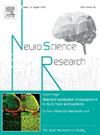Fluoxetine, but not paroxetine, alters the jaw-closing muscle activity during non-rapid eye movement sleep in mice
IF 2.3
4区 医学
Q3 NEUROSCIENCES
引用次数: 0
Abstract
Sleep bruxism is an involuntary, exaggerated jaw-closing activity during sleep. Selective serotonin reuptake inhibitor (SSRI) use is a risk factor for bruxism. However, the effect of various SSRIs on masseter (jaw-closing) muscle activity remains unclear. Here, we examined the effects of long-term administration of two SSRIs, fluoxetine (FLX) and paroxetine (PRX), for 14 days on masseter muscle activity during wakefulness, non-rapid eye movement (NREM) sleep, and rapid eye movement (REM) sleep for 24 h in mice. Vigilance states were scored based on electroencephalographic, electrooculography and neck electromyographic (EMG) activities. The EMG activity of the masseter muscle was quantified in 6 h periods. FLX and PRX did not affect the duration of the three vigilance states. Both drugs significantly prolonged the REM sleep episode duration while decreasing the number of episodes. FLX significantly increased REM sleep onset latency. Neither FLX nor PRX affected the mean masseter EMG activity during wakefulness. FLX significantly increased the relative time of masseter muscle activity in NREM sleep during 02:00–08:00 and 08:00–14:00, while PRX did not affect three vigilance states. Overall, FLX had a limited but significant effect on masseter muscle activity in NREM sleep during specific periods.
氟西汀(而非帕罗西汀)会改变小鼠非快速眼动睡眠时下颌闭合肌肉的活动。
睡眠磨牙症是指睡眠时下颌不自主地、夸张地闭合。使用选择性血清素再摄取抑制剂(SSRI)是磨牙症的一个危险因素。然而,各种 SSRI 对颌面部肌肉活动的影响仍不清楚。在此,我们研究了长期服用两种 SSRIs(氟西汀(FLX)和帕罗西汀(PRX))14 天对小鼠清醒、非快速眼动(NREM)睡眠和快速眼动(REM)睡眠 24 小时期间颌间肌活动的影响。根据脑电图、脑电图和颈部肌电图(EMG)活动对警觉状态进行评分。咀嚼肌的肌电图活动在 6 小时内被量化。FLX 和 PRX 不影响三种警觉状态的持续时间。这两种药物都能明显延长快速眼动睡眠发作持续时间,同时减少发作次数。FLX 明显增加了快速动眼期睡眠的起始潜伏期。FLX 和 PRX 均不影响清醒时的平均咀嚼肌肌电图活动。FLX 能明显增加 02:00-08:00 和 08:00-14:00 NREM 睡眠中颌面肌肉活动的相对时间,而 PRX 对三种警觉状态没有影响。总体而言,FLX 在特定时段对 NREM 睡眠中的颌下肌活动有有限但显著的影响。
本文章由计算机程序翻译,如有差异,请以英文原文为准。
求助全文
约1分钟内获得全文
求助全文
来源期刊

Neuroscience Research
医学-神经科学
CiteScore
5.60
自引率
3.40%
发文量
136
审稿时长
28 days
期刊介绍:
The international journal publishing original full-length research articles, short communications, technical notes, and reviews on all aspects of neuroscience
Neuroscience Research is an international journal for high quality articles in all branches of neuroscience, from the molecular to the behavioral levels. The journal is published in collaboration with the Japan Neuroscience Society and is open to all contributors in the world.
 求助内容:
求助内容: 应助结果提醒方式:
应助结果提醒方式:


